About Broken Utterances | Broken Utterances connects the seemingly disparate voices of twenty Black women of the 1800′s, and weaves a cohesive web revealing surprising influences not only upon each other, but also on the experiences of Black women today. It is an examination of how the unique position of the African American woman provides her with the ability to dissect the ills of society and offer distinctive insight for positive transformation. The book is a multi-media work featuring primary texts, biographies, original illustrations and translations into contemporary vernacular.
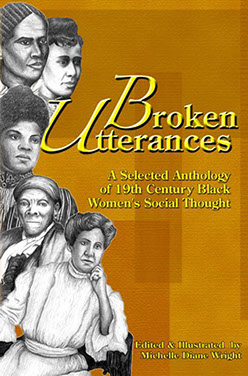
1
Broken Utterances | The Author
2
Broken Utterances | The Women
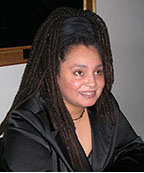
Author Michelle Diane Wright earned a B.A. in English and Art History from Dartmouth College, an M.A. in Black Studies and an M.S. in Political Science from The Ohio State University. For five years she published natural Alternatives, an Afrikan centered guide for holistic living. Michelle edited both The Case of Marshall Eddie Conway, a book exploring the legal battles of the former Black Panther and political prisoner, and Broken Utterances: An Anthology of 19th Century Black Women’s Social Thought. Michelle has been published in the Western Journal of Black Studies, The Afro American Newspaper, among other national publications. Also an artist, Michelle has exhibited at the Eubie Blake Cultural Center in Baltimore. She is also a Professor of History and heads the Africana Studies Department at the Community College of Baltimore County, Maryland.
Included in Broken Utterances are the writings of :
Maria W. Stewart
Sarah Mapps-Douglass
Jarena Lee
Ann Plato
Harriet Tubman
Sojourner Truth
Sarah Parker Remond
Frances E.W. Harper
Charlotte Forten Grimke
Elizabeth Keckley
Anna Julia Cooper
Frances Ann Rollin
Frances Barrier Williams
Gertrude Bustill Mossell
Joseph St. Pierre Ruffin
Victoria Earle Matthews
Ida B. Wells-Barnett
Mary Church Terrell
3
Broken Utterances | Reviews
AALBC: These and so many other searing narratives combine to make Broken Utterances not merely a fascinating read, but a seminal contribution to the field of black feminist intellectual thinking. Read full review
A great text for educators and students of history
The modern day interpretations make it easy for today's student to understand the language of the past
The hand drawn images by the author are beautiful and enhance the writing!
Inside Broken Utterances | Select Images and Writings
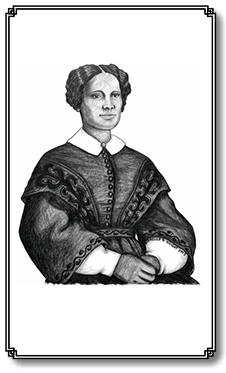
Sarah Parker Remond (1826-1894)
“The friends of the Negro should recognize the fact, that the process of degradation upon this deeply injured race has been slow and constant, but effective. The real capacities of the Negro race have never been thoroughly tested. With all the demoralizing influences by which they are surrounded, they still retain far more of that which is humanizing than their masters. No such acts of cruelty have ever emanated from the victims of slavery in the Southern states as have been again and again practised by their masters.”
INCLUDED SELECTIONS
· “Why Slavery Is Still Rampant” (Manchester, England speech) – 1859
· * “The Negroes in the United States of America” (London, England speech) – 1862
*Full or partial translation of this selection is included.
Fanny Jackson Coppin (1835-1913)
“I wish by no means to be among that class of people that counsel words without knowledge. We, as a people, have suffered greatly from what may be termed the ‘sizing-up,’ and the regulation ‘putting down,’ and setting forth of what it was possible for us to do. Our idea of getting an education did not come out of wanting to imitate any one whatever. It grew out of the uneasiness and the restlessness of the desires we felt within us; the desire to know, not just a little, but a great deal.”
INCLUDED SELECTIONS
· Speech given at the Congress of Representative Women – 1893
· Excerpts from Methods of Instruction – Exact date unknown (published 1913)
Victoria Earle Matthews (1861-1907)
If our newspapers and magazines do not amount to anything, it is because our people do not demand anything of better quality from their own. It is because they strain their purses support-ing those white papers that are and always will be independent of any income derived from us. Our contributions to such journals are spasmodic and uncertain, like fluctuating stocks, and are but an excess of surplus. It is hard for the bulk of our people to see this; it is even hard to prove to them that in supporting such journals, published by the dominant class, we often pay for what are not only vehicles of insult to our manhood and womanhood, but we assist in propagating or supporting false impressions of ourselves or our less fortunate brothers.”
INCLUDED SELECTIONS
· “The Value of Race Literature” – An Address Delivered at the First Congress of Colored Women of the United States, 1895
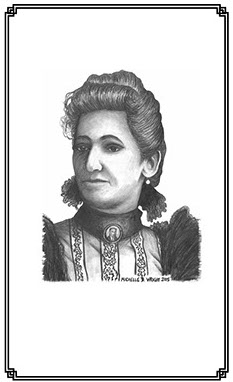
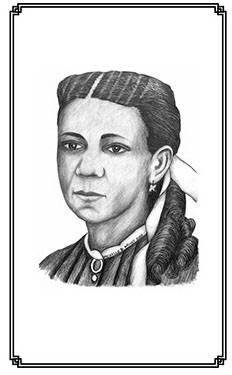
Read a free chapter |
Use the PDF Viewer to the left
Contact the publisher | Please fill out the form below
Academic Orders | To order copies for your classroom with an educational discount, please complete the form below and be sure to include the name of your institution.










